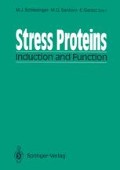Abstract
As part of the cellular response to sublethal heat stress there is a rapid and coordinated increase in the expression of a group of proteins, the heat shock proteins (HSPs), or stress proteins (see Burdon 1986, 1988; Lindquist 1986). It is now clear that at least some of these stress proteins are essential for the survival of cells confronted with temperature and other stresses. In addition to elevated temperatures, a variety of other treatments will elicit the increased production of the HSPs. These include certain heavy metals, high levels of ethanol and amino acid analogues. Because of the possibility that these alternative inducers, like heat, could create abnormal protein structures within the cell, it is believed that the intracellular accumulation of abnormal proteins may be an important element in mechanisms leading to HSP induction (Munro and Pelham 1985; Anathan et al. 1986).
Access this chapter
Tax calculation will be finalised at checkout
Purchases are for personal use only
Preview
Unable to display preview. Download preview PDF.
References
Anathan J, Goldberg AC, Voellmy R (1986) Abnormal proteins serve as eukaryotic stress signals and trigger activation of heat shock genes. Science 232:522–524
Boveris A (1977) Mitochondrial production of superoxide radical and hydrogen peroxide. Adv Exp Med Biol 78:67–75
Bowler K (1987) Cellular heat injury: are membranes involved? In: Bowler K, Fuller BJ (eds) Temperature and animal cells. Symp Soc Exp Biol 41:157–185, The Company of Biologists Ltd, Cambridge
Burdon RH (1986) Heat shock and the heat shock proteins. Biochem J 240:313–324
Burdon RH (1988) The heat shock proteins. Endeavour 12:133–138
Burdon RH, Slater A, McMahon M, Cato ACB (1982) Hyperthermia and the heat shock proteins of HeLa cells. Br J Cancer 75:953–963
Burdon RH, Gill V, Rice-Evans C (1990) Radicals and stress protein induction In: Rice-Evans C et al. (eds) Stress Proteins in inflammation. Richelieu Press, Lond (in press)
Carmichael J, De Graff WG, Gazdar AF, Minna JD, Mitchell JB (1987) Evaluation of a tetrazolium-based semiautomated colorimetric assay: assessment of chemosensitivity testing. Cancer Res 47:936–942
Eddy LJ, Stewart JR, Jones HP, Engerson TD, McCord JM, Downey JM (1987) Free radical producing enzyme, xanthine oxidase is undetectable in human hearts. Ann J Physiol 253 H-709
Edington BV, Whelan SA, Hightower LE (1989) Inhibition of heat shock stress protein induction by deuterium oxide and glycerol: additional support for the abnormal protein hypothesis of induction. J Cell Physiol 139:219–228
Halliwell B, Gutteridge JMC (1985) Free radicals in biology and medicine. Clarendon Press, Oxford
Lee DC, Chapman D (1987) The effects of temperature on biological membranes and their models. In: Bowler K, Fuller BJ (eds) Temperature and animal cells. Symp Soc Exp Biol 41:35–52. The Company of Biologists Ltd, Cambridge
Li GC, Shrieve DC (1982) Thermal tolerance and specific protein synthesis in Chinese hamster fibroblasts exposed to prolonged hypoxia. Exp Cell Res 142:464–468
Lin P-S, Hefter K, Ho K-C (1984) Modification of membrane function, protein synthesis and heat killing effect in cultured Chinese hamster cells by glycerol, and D20. Cancer Res 44:5776–5784
Lindquist S (1986) The heat shock response. Ann Rev Biochem 55:1151–1191
McCord JM, Fridovich I (1988) Superoxide dismutase: the first twenty years, 1968–1988. Free Rad Biol Med 5:363–369
Munro S, Pelham H (1985) What turns on heat shock genes? Nature (Lond) 137:477–478
Nohl H, Breuninger V, Henger D (1978) Influence of mitochondrial radical formation on energy linked respiration. Eur J Biochem 90:385–393
Pelham HRB (1985) Activation of heat shock genes in eukaryotes. Trends Genet 1:31–35
Ropp M, Courgeon AM, Calvayrae R, Best-Belpomme (1983) The possible role of the superoxide ion in the induction of heat shock and specific proteins in aerobic Drosophila cells after a period of anaerobiosis. Can J Biochem Cell Biol 61:456–461
Spitz DR, Dewey WC, Li GC (1987) Hydrogen peroxide or heat shock induces resistance to hydrogen peroxide in Chinese hamster fibroblasts. J Cell Physiol 131:364–373
Author information
Authors and Affiliations
Editor information
Editors and Affiliations
Rights and permissions
Copyright information
© 1990 Springer-Verlag Berlin Heidelberg
About this paper
Cite this paper
Burdon, R.H., Gill, V., Evans, C.R. (1990). Active Oxygen Species and Heat Shock Protein Induction. In: Schlesinger, M.J., Santoro, M.G., Garaci, E. (eds) Stress Proteins. Springer, Berlin, Heidelberg. https://doi.org/10.1007/978-3-642-75815-7_2
Download citation
DOI: https://doi.org/10.1007/978-3-642-75815-7_2
Publisher Name: Springer, Berlin, Heidelberg
Print ISBN: 978-3-642-75817-1
Online ISBN: 978-3-642-75815-7
eBook Packages: Springer Book Archive

